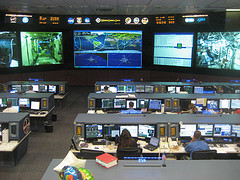Project:Hackney Space Centre: Difference between revisions
m (Created page with "HackSat1 will be in LEO. In order to receive signals in the space we'll need to build a ground station and control room. From the KickSat project: ''The s...") |
No edit summary |
||
| Line 1: | Line 1: | ||
[[Project:HackSat1|HackSat1]] will be in LEO. In order to receive signals in the space we'll need to build a ground station and control room. | [[Project:HackSat1|HackSat1]] will be in LEO. In order to receive signals in the space we'll need to build a ground station and control room. | ||
[[File:space-control-centre.jpg]] | |||
Ideas or experience in this area needed. | |||
To receive the signals, you'll need a yagi antenna, a rotator, an LNA, and a software defined radio (SDR) interface for your computer. We've been using the USRP from Ettus Research, but it's pretty expensive, so we're trying to make everything work with the (much cheaper) FUNCube dongle (http://www.funcubedongle.com/) as well.'' | == Requirements == | ||
Following comes from the KickSat project: | |||
''The signals will be in the 70 cm band (around 437 MHz) at about 10 dBm EIRP. All Sprites will be on the same frequency and will use orthogonal PRN spreading codes for both unique identification and signal processing gain.'' | |||
''To receive the signals, you'll need a yagi antenna, a rotator, an LNA, and a software defined radio (SDR) interface for your computer. We've been using the USRP from Ettus Research, but it's pretty expensive, so we're trying to make everything work with the (much cheaper) FUNCube dongle (http://www.funcubedongle.com/) as well.'' | |||
''Photo courtesy of [http://www.flickr.com/photos/jeffhester/2784666811 Jeff Hester].'' | |||
Revision as of 14:41, 27 October 2011
HackSat1 will be in LEO. In order to receive signals in the space we'll need to build a ground station and control room.
Ideas or experience in this area needed.
Requirements
Following comes from the KickSat project:
The signals will be in the 70 cm band (around 437 MHz) at about 10 dBm EIRP. All Sprites will be on the same frequency and will use orthogonal PRN spreading codes for both unique identification and signal processing gain.
To receive the signals, you'll need a yagi antenna, a rotator, an LNA, and a software defined radio (SDR) interface for your computer. We've been using the USRP from Ettus Research, but it's pretty expensive, so we're trying to make everything work with the (much cheaper) FUNCube dongle (http://www.funcubedongle.com/) as well.
Photo courtesy of Jeff Hester.
